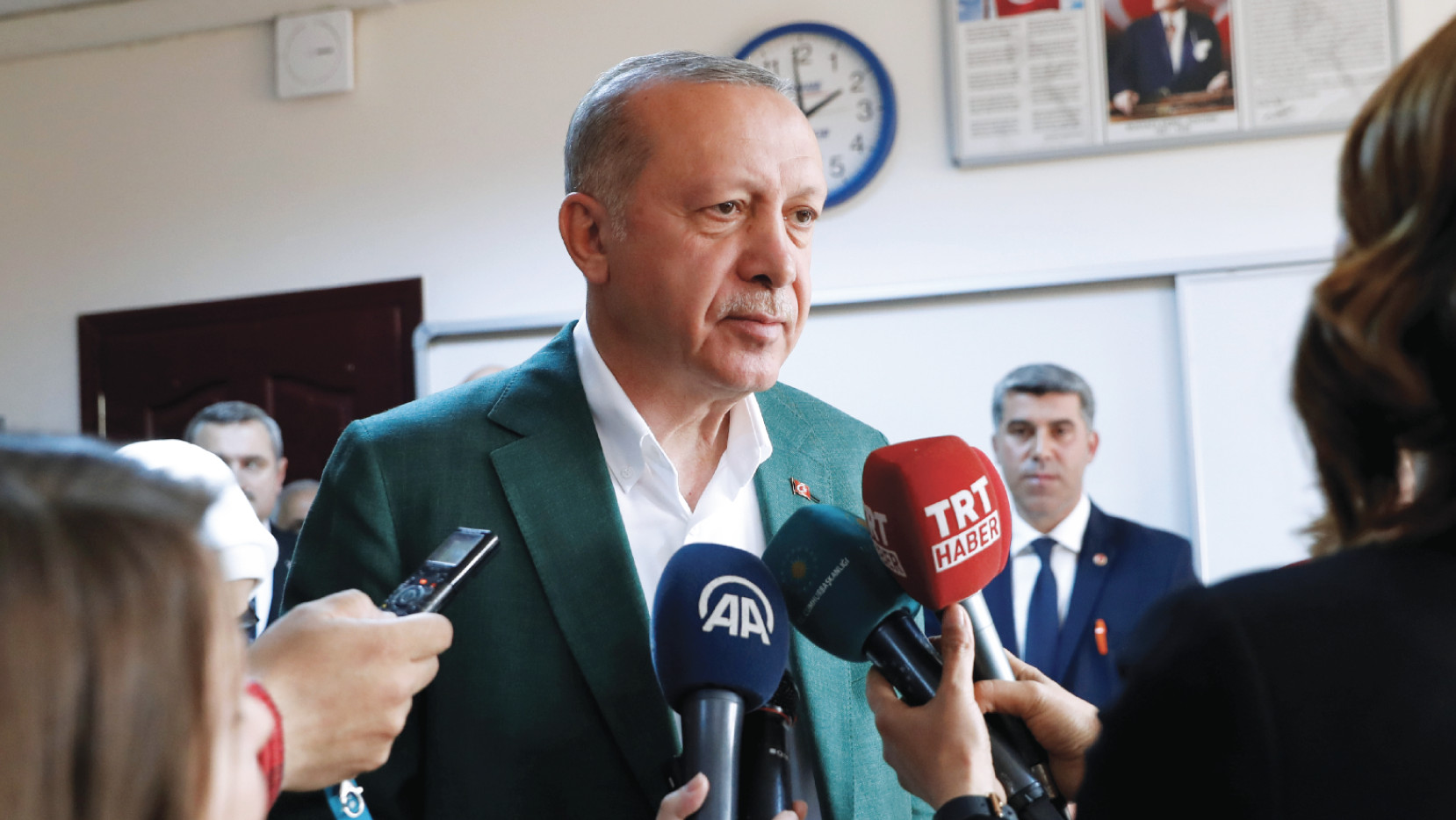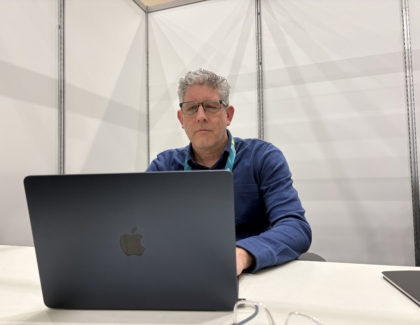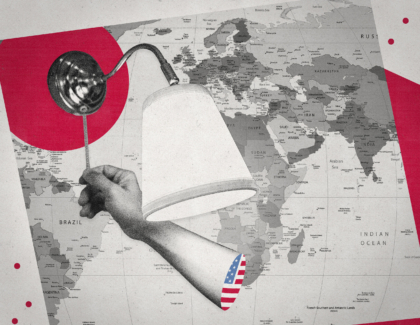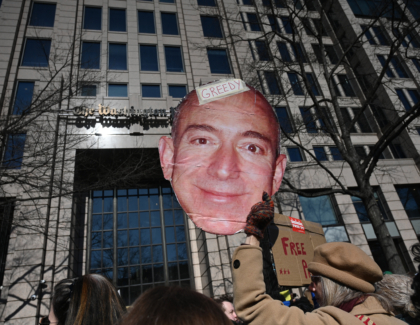Sign up for the daily CJR newsletter.
Last week, a sex tape purporting to feature Muharrem İnce, a third-party candidate in Turkey’s presidential election, circulated online. İnce said that the tape was a deepfake—“This is not my private life, it’s slander,” he said, according to The Guardian, claiming that the footage had been ripped from an “Israeli porn site”—but he dropped out of the race regardless, citing a longer campaign of character assassination. “What I have seen in these last forty-five days, I have not seen in forty-five years,” he said. The supposed sex tape was not the only occasion on which claims of technological deception had surfaced during the campaign. Kemal Kılıçdaroğlu, the main opposition candidate, accused Russia (without offering specifics) of weaponizing deepfake technology to boost Recep Tayyip Erdoğan, the incumbent president. And, at a rally, Erdoğan played footage that had been manipulated to suggest close ties between Kılıçdaroğlu and the Kurdistan Workers’ Party, which the US and EU have branded a terrorist group.
According to the BBC, İnce also said that he was dropping out to avoid being blamed for splitting the anti-Erdoğan vote. At the time, pundits deemed it a live possibility that, despite İnce’s slender support, his withdrawal could put a nail in Erdoğan’s coffin after twenty years in power—with days to go until the vote, Kılıçdaroğlu was polling just one percentage point shy of the 50 percent threshold needed to win the election outright. But the results would paint a different picture: as the official count neared completion, it was Erdoğan who sat just shy of that threshold, with Kılıçdaroğlu further back, at 45 percent of the vote. (In confidently predicting Erdoğan’s demise, many pundits, Sinan Ciddi and Steven A. Cook wrote for Foreign Policy, indulged “too much focus on polls” and “too much Twitter navel-gazing.” Sound familiar?) The election is now set for a runoff on May 28. Erdoğan is expected to prevail—despite having overseen an economic crisis, deepening political authoritarianism, and the botched response to the massive earthquake that devastated southern Turkey and neighboring Syria in February.
Among other groups, the stakes of the election have been particularly acute for Turkey’s press, which has seen its freedom to report systematically eroded under Erdoğan. While the election was mostly considered to be free, it was also in many respects unfair—not least due to Turkey’s deeply skewed media environment. After the first round, observers led by the Organization for Security and Cooperation in Europe deemed that “continued restrictions on fundamental freedoms of assembly, association, and expression hindered the participation of some opposition politicians and parties, civil society, and independent media in the election process.”
As the election unfolded, I spoke with my colleague Pesha Magid, who has covered Turkey, including for CJR; in March, she profiled a reporter who had tracked the aftermath of, and political fallout from, the earthquake. We talked about the context for the vote, the threats that journalists faced in covering it, and what a victory for Erdoğan or Kılıçdaroğlu would respectively mean for press freedom. Our typed conversation has been lightly edited for clarity.
You recently wrote for CJR about Murat Bayram, a reporter in Turkey who covered the aftermath of the devastating earthquake that hit that country and Syria earlier this year. How did the upcoming election play into your—and his—reporting? And how has the earthquake aftermath affected the election—and the coverage of it—since then?
Since the earthquake, I think the election has been lurking at the back of most people’s minds who cover Turkey. The failure of the government’s earthquake response caused a backlash of anger from communities that would normally support Erdoğan’s Justice and Development Party (AKP). Many survivors were firsthand witnesses to the government’s fatal mismanagement of the emergency response, waiting days for lifesaving rescue teams to show up. Over fifty thousand people died in the earthquake. Many of those deaths could have been prevented either through a competent rescue effort or through the government enforcing building codes.
Murat Bayram witnessed for himself some of the anger on the streets when he was reporting on the earthquake. He spoke about people who were asking where the government and the media were. I don’t think anyone has forgotten the earthquake or the images that spread on social media of people waiting for their loved ones to be rescued from the rubble. There’s an odd symmetry with Erdoğan’s own rise to power, which followed another devastating earthquake in 1999 and a bungled response from the government of the time. One of Erdoğan’s electoral promises back then was to do better on earthquake preparedness.
The coverage of the election in Turkey has been a complicated topic as the vast majority of major news organizations have been co-opted by the government and no longer provide independent or critical reports. Much of the government-affiliated press took the line that the earthquake was an unpreventable disaster and that the government was doing the best it could. They blamed scapegoats for some of the worst failures. Election coverage has followed a similar pattern of most major channels supporting the AKP, while a slim slice of independent media has been providing more critical coverage.
Going into the election, what were the stakes for the Turkish press?
Under Erdoğan, Turkey has become one of the world’s worst jailers of journalists. Journalists are commonly beaten, harassed, or targeted with legal cases. Only a scattered few small outlets remain independent. The stakes were the freedom of the press as a whole.
Did we see any repression of the press linked directly to election coverage? And how did this affect the way the first round of the election was conducted?
The short answer is yes. Since May 9, at least four journalists have been found guilty of terrorism charges, while others have faced beatings and harassment during their work.
On May 10, a journalist named Muhammed Yavaş posted a critique of the Grey Wolves, a hypernationalist group, on Facebook, only to then be beaten up by a local leader of the group. In a joint statement on May 10, the monitoring organizations Human Rights Watch and Article 19 warned of the Turkish government’s history of online censorship and throttling of social media ahead of the elections; subsequently, Twitter blocked some posts inside Turkey.
There was also the worry that pro-government media may skew information in favor of the AKP. According to the journalist Amberin Zaman, writing in Al-Monitor, “In April, Erdoğan got thirty-two hours of airtime on state TV compared with thirty-two minutes for Kılıçdaroğlu.” As the election results began to come in, some expressed fears that the state-run Anadolu agency may preemptively announce an Erdoğan victory before all the results were counted. In the end, both sides claimed to be ahead, with Erdoğan telling his supporters, “Although the final results are not in yet, we are leading by far,” according to the New York Times.
What has the opposition, led by Kılıçdaroğlu, said about press freedom in the country, if anything? And how credible has that sounded?
Kılıçdaroğlu has promised a return to “democracy,” and many journalists expressed hope that this would mean that press freedom would again be possible. Many media watchers seem cautiously hopeful that a Kılıçdaroğlu victory would also be the way to open the door to an independent press. “We still would have a press freedom problem if the opposition takes power,” said Kenan Şener, general secretary of the Ankara-based Journalists’ Association, in an interview with the Committee to Protect Journalists. “However, I believe it’s certain that we will be in a better spot than this.”
On the other hand, when Kılıçdaroğlu’s opposition party, the CHP, was in power in the nineties, it had a checkered record when it came to freedom of the press. It was known for also jailing journalists who opposed it, although not to the same extent as Erdoğan.
How do you see the Turkish media landscape changing as a result of this election, as it now heads to a runoff?
It truly depends on the results. If the opposition wins then I anticipate that we will see an initial gleeful rush of media freedom as journalists stretch their wings for the first time in years. But it’s unclear how long that would last—as I said, the CHP does not have the best record when it comes to journalists— though it seems unlikely that the crackdown on the press would remain as stringent as it has been under Erdoğan. I am hopeful that journalists who have long been in jail on trumped-up charges might finally be released.
If Erdoğan wins, things will undoubtedly get worse. If nothing else, the closeness of this election shows that the AKP’s grip on power is fraying. That insecurity may cause it to take an even more draconian grip on power. As Barış Altıntaş, the director of Istanbul’s Media and Law Studies Association, said in the same CPJ interview: “If they [the AKP] win by a slim margin, they might lose some of their perceived legitimacy, feel cornered, and become more repressive toward free speech and media freedoms.”
Other notable stories:
- The jumble of possible explanations for Tucker Carlson’s ouster from Fox News gained another thread yesterday when Variety’s Tatiana Siegel reported that a Fox board member told Carlson his sacking was a verbal condition of the network’s recent defamation settlement with Dominion Voting Systems, though both Fox and Dominion strongly denied the report. Siegel also reports that Carlson is set to launch a new show on Twitter within the next month, and that “a handful of Fox anchors” have told him that they’re interested in joining him when their Fox contracts expire. Elsewhere, Charles Homans, of the New York Times, questions whether Carlson will be able to “play a similar role as a conduit between the far right and the mainstream without Fox.”
- CNN’s town hall with Donald Trump last week continues to generate fallout: CNBC’s Alex Sherman reported yesterday that Chris Licht, CNN’s CEO, has now watched the event back and—while standing behind his decision to hold it—highlighted “several production elements that he would have liked done in a different way,” in order to elevate “substance” over the “spectacle of Trump.” Elsewhere, Lawfare’s Quinta Jurecic and Tyler McBrien jumped off the town hall to assess what the media has and hasn’t learned in covering Trump since 2016, pointing to a few “glimmers of improvement” but concluding that these alone aren’t sufficient and could yet be undone heading into 2024.
- Yesterday, Sam Altman—the CEO of OpenAI, the creator of ChatGPT—appeared before a Senate subcommittee and “largely agreed” with lawmakers’ calls to regulate AI and its impact on the job market, Cecilia Kang reports for the Times. The hearing was less confrontational than prior congressional sessions with tech CEOs, though the details of any proposed regulation remain unclear, and critics cast Altman’s remarks as inadequate and hypocritical. Elsewhere, staffers at CNET—which recently came under fire for errors in AI-written articles—are unionizing, per Mia Sato of The Verge, citing AI as one reason.
- Recently, PEN America, a free-expression organization, canceled a panel discussion featuring exiled Russian writers after Ukrainian writers who were scheduled to speak on a separate panel at the same event said that they could not participate under the same umbrella as the Russians. (Two of the Ukrainian writers serve in their country’s military.) The decision to cancel led Masha Gessen, a staff writer at The New Yorker, to resign from PEN’s board in protest. The Atlantic’s Gal Beckerman has more details.
- And—after recently scrapping the use of “Inc.,” “Corp.,” “Ltd.,” and similar designations from most company titles—the Wall Street Journal announced a major style change around human names, dropping honorifics such as “Mr.” and “Ms.” from its copy. Emma Tucker, the editor in chief, said that the change “will help make our writing livelier and more approachable” but insisted that “we aren’t abandoning politeness or principle.”
ICYMI: What a national-security regulator could mean for media deals
Has America ever needed a media defender more than now? Help us by joining CJR today.







